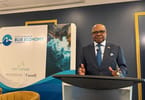MAKING AN ENTRY
They would be on the ground in Tokyo for just 40 hours. They were ready for a signature, and had flown 10 hours to get it. Proposal packs were exact to
specification. Through the flight from DFW to NRT, and all the way to the hotel in Ginza, the details of the proposal were reviewed, over and over and over. Their first impression would no doubt be unforgettable. Quick change, quick coffee, and quick elevator ride, and the meeting was ready to begin.
Entering the meeting room, the team arriving in from the United States could feel a difference in chemistry compared to meetings back home. The team from Japan, all impeccably dressed, seemed to stand a little straighter, all in a straight line. As the American team entered, the team from Japan, in unison, gave a subtle bow of the head.
The Americans were the first to speak. “Mike Thompson, good to meet you.” Swiftly outstretching his arm, he gave one of the Japanese gentlemen a firm handshake, taking a business card from his jacket pocket and handing it to his prospective client. The gentleman from Japan received the US business card with two hands, looked at it for a moment, turned it over to see the other side, and then smiled. M. Thompson, President, North America Division, the card read. With two hands and another gentle bow, he then presented his business card to his guest. H. Hashizumi, President, Asia Pacific it read. The US company president took the Japanese business card and, without even looking at it, swiftly put it into his suit jacket pocket. Standing behind his company president, the Chief Legal Advisor of
the US team could see a look of almost cold discomfort on the face of the
Japanese president. And he knew exactly why. Stepping forward, he looked the
Japanese president in the eye, kept his arms straight at his side, gave a gentle bow and said in a soft voice “Hashizumi-san, it is a pleasure to meet you.” With two hands he presented the Japanese president with his card. Similarly, he received Hashizumi-san’s card with two hands, looked at it on both sides with quiet appreciation, and then gently bowed.
There was no mistaking it – he could see the stern look on the face of his new Japanese colleague before him turn to a smile. And he could feel the room become warmer.
With each new day, a new part of the world is opening up. Travelers across the globe, be they on journeys of business or pleasure, now enjoy a remarkable ability to gain access. Places that inspire curiosity, opportunity, learning, and growing are just a train ride, flight, cruise, or drive away. The ability to cross borders and enter into new countries, with cultures and codes profoundly different to those of one’s own world, has become a wonderful reality. The blessing of travel has become a means for people across the globe to come closer in thought, understanding,
appreciation, and cooperation.
From a destination perspective, the growth of the tourism sector has brought with it not just new faces, but new opportunities. Job creation, environmental development, social unity, national competitiveness, and global acceptance offer tourism destinations a strengthening of spirit which, in turn, strengthens confidence in future possibility. As a result, increasingly, destinations are working to simplify and slipstream travel processes to enable growth in arrivals. Regulations, restrictions, and entry requirements are being revisited. Costs and connections of travel are
being reduced to encourage travelers to make the journey, with offers such as visa-on-arrival services being introduced to eliminate pre-travel cost, time, and hassles. Red tape is being replaced by red carpets. The message is clear: you are invited.
From a traveler perspective, destinations go a long way to emphasize just how smooth, safe, and satisfying travel can be. Barriers to entry, physically, administratively, financially, and psychologically are being dropped. With a world of destinations opening their doors to travelers, there is no question that the welcome mat has been put out. Now is the time for the traveler to happily run through the front door.
However, as open as nations are to welcoming a world of visitors, one thing that the visitor must never forget is that they are a guest in someone else’s home.
KNOWING WHEN TO KNOCK
Entry into a new nation is first felt, literally and figuratively, at border crossings. Here, in patient and obedient lines, business travelers and holiday makers come together and await the same sound of success – a rubber stamp being firmly pressed onto the page of a passports. Approved for entry. In addition to date of arrival, terms of arrival such as validity periods and restrictions of entry often appear. House rules. As long as these rules are respected, visitors are welcome to make themselves at home.
For travelers, this check-in/be checked out has become an accepted part of
entering into a new world. Once stamped in, from that point on, the traveler feels free to explore and enjoy the destination.
Such official points of arrival into a nation are not, however, the front door. In today’s times of increased security and care of one’s own spaces, immigration desks are, in fact, the front gate. In the same way that seeing and touching a place does not mean truly feeling its heartbeats, being inside does not mean being accepted as an insider.
To be genuinely accepted, welcomed in, shown around, and encouraged to
stay, a visitor must ensure that the privilege of being welcomed into the home of others is honored. There is more to it than simply entering through the front door. It is about understanding the codes and customs of the destination. It is about knowing when to knock.
Travel to destinations of cultural difference, those that cause our antennas to go up, spin about, and spark happily in sensual delight, soaking up all of its diverse and delightful stimuli, brings to life all that is the gift of travel. The blessing of our ability to move freely around the globe, creating new connections, should never be taken for granted.
There is great power in the ability to travel to a new place. But with that power comes a responsibility – a responsibility to ensure that those welcoming a traveler in are left feeling pleased that they opened the door.
AS IMPORTANT AS LANGUAGE
As travelers to new places know, a simple “hello” and “thank you” in another’s language has the ability to turn the curious look of a local into a warm smile. When understood, in spoken word and genuine intent, even the most “foreign” of travelers is able to enter deeper into the trust, textures and truths of a nation – its bringing people of the destination closer, allowing them to share a bit of their home with you.
So often overlooked, however, is the importance of understanding and
respecting what can be as important as language, if not more so. It unites its people each and every day in spirit, sensibility, and practice: customs and codes.
To understand and respect the codes and customs of a destination is a
fundamental part of being a good traveler. Not only does it show respect for the welcoming nation, as a visitor it provides richer insight and appreciation for the way of life of its people. And, critically, it ensures that visitors remain safe.
Because the reality is this: as much as a traveler can experience culture shock, so too can a traveler inflict it on the people of the destination. Little is required to turn simple errors in behavior on the part of a traveler into an overt act of offense. Or even a crime. For this reason, the importance of cultural sensitization is gaining strength.
MAKING A GENUINE CONNECTION
Understanding the fabric of a society through its culturally-embedded codes,
concepts, and practices not only increases one’s ability to enter a new
environment with greater acceptance, it also opens up a whole new world of
understanding that will, without a doubt, make for a more meaningful local
exchange and connection.
As stated by James Ginns, General Manager of Marketing and Product at Cathay
Pacific Airlines Limited, and based in Hong Kong:
“With increased global integration being forged by technology, and
increasing economic interdependency and trends in travel, fashion, and
popular culture, it is easy to be deceived into thinking that local customs
and codes no longer matter, that the world is becoming a polyglot, amorphous village. However, travel or do international business at your peril if you don’t believe in the need to respect local differences. There is no shortcut to thorough research into the particular habits, thinking, trends, laws, and outlooks of the community in which you are going to be
operating.”
Being aware of customs unique to certain parts of the world is essential to ensure that, as a visitor, no signs of disrespect are shown, and no laws are broken. Seemingly simple principles such as:
– the importance of face,
– respectful interaction with women,
– attitudes towards elders,
– gift giving,
– protocols within monarchies and government officials,
– accepting business cards with two hands,
– women covering their shoulders and knees when visiting places of worship,
– refraining from showing the soles of one’s feet, and
– avoiding political discussion in public places,
must be understood. Of critical importance: no means no. Not maybe. No.
Regardless of what passport you carry. No traveler has a right to break the rules of a nation in which they are a visitor, be it for work or play. “Because I can!” can lead to unnecessary and unacceptable trouble for the traveler, the destination, and even the traveler’s government/employer/family.
Such surface-level understanding allows for a fluidity, acceptability, and ultimately safety of travel movement. As revealed by a topline comparison by The Office of the Deputy Chief of Staff for Intelligence, US Army Training and Doctrine Command (01.06), being aware of respective positions as societies, enables understanding of the heart of a person. A general natural drawing of comparison allows for such differences to be made clear, as they share below in their comparison of Eastern (Arab and Asian) and Western (American and European) perspectives.
EASTERN Perspective:
– Family – Center of everything. (Father has first and last word.).
– Friends – Periphery, but courteous to all.
– Honor – Very Important among Arabs. Honor will be protected and defended at all costs.
– Shame (especially against family) – avoided at all costs, insults and criticism taken very seriously.
– Time – less rigid. Approach to time is much more relaxed and slower than
that in Western cultures.
– Religion – Central to all things.
– Society – Family/tribe is most important.
– Government – Most governments are secular, but still emphasize religion.
– Age and Wisdom honored.
– Wealth honored.
WESTERN Perspective:
– Family – Important but not as central to individual.
– Friends – Core to some, important to most.
– Honor – Typically not as important.
– Shame – Typically not as important.
– Time – Very structured, deadlines must be met.
– Religion – Varies by individual, very personal, not discussed in polite
conversation.
– Society – Individual rights.
– Government – Purpose is to protect rights and improve standard of living.
– Youth and Beauty praised.
– Wealth honored.
Interestingly, significant parallels can be drawn between Arab culture and the people of Asia.
However one decodes a nation, understanding cultural codes and customs is not just about finding the answers, it is also about the joy of asking someone new to tell you more about them. It is about making a new connection, gaining a new perspective.
Each of us, as travelers, has a story, a flag, and a heartbeat to share. By shutting our eyes, opening our hearts, and looking deeper into the places that we visit, the sheer delight of discovering the world beyond our front door is given remarkable richness of meaning, increasing our desire to go visit our neighbors.
WHAT TO TAKE AWAY FROM THIS ARTICLE:
- Japanese president in the eye, kept his arms straight at his side, gave a gentle bow and said in a soft voice “Hashizumi-san, it is a pleasure to meet you.
- Through the flight from DFW to NRT, and all the way to the hotel in Ginza, the details of the proposal were reviewed, over and over and over.
- The gentleman from Japan received the US business card with two hands, looked at it for a moment, turned it over to see the other side, and then smiled.










![China's Hyperloop Train: A Glimpse into the Future of Transportation 8 Travel Tourism News | Domestic & International Hyperloop Train China [Photo: Hyperloop Transportation Technologies]](/cdn-cgi/image/width=145,height=100,fit=crop,quality=80,format=auto,onerror=redirect,metadata=none/wp-content/uploads/2024/02/180720163348-hyperlooptt-china-capsule.jpg)











